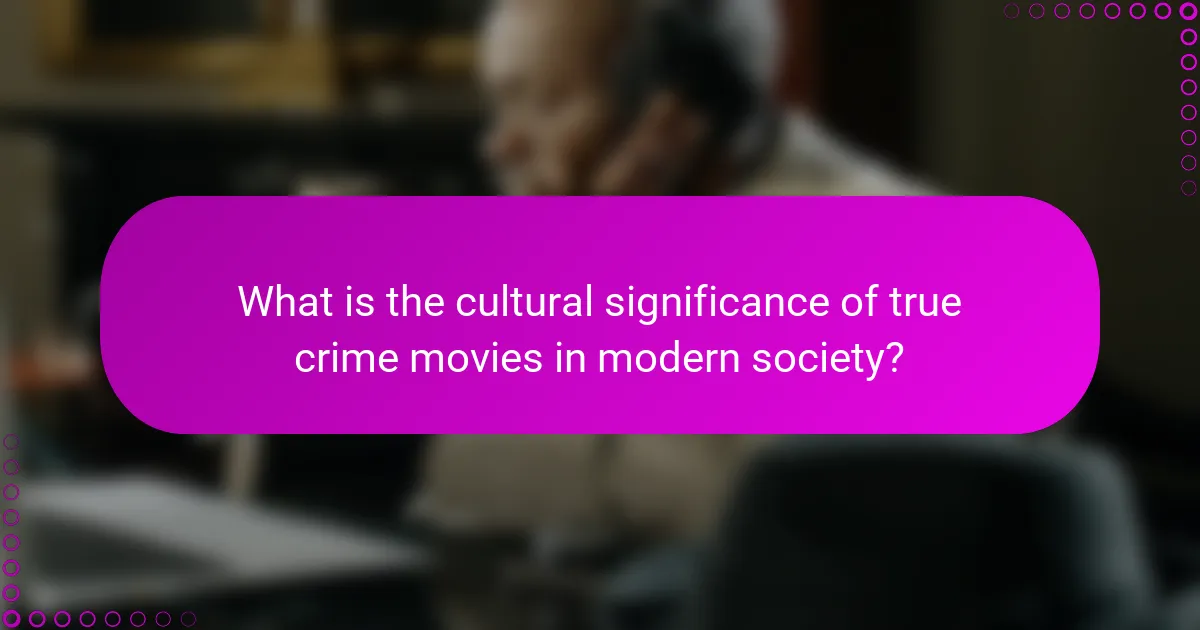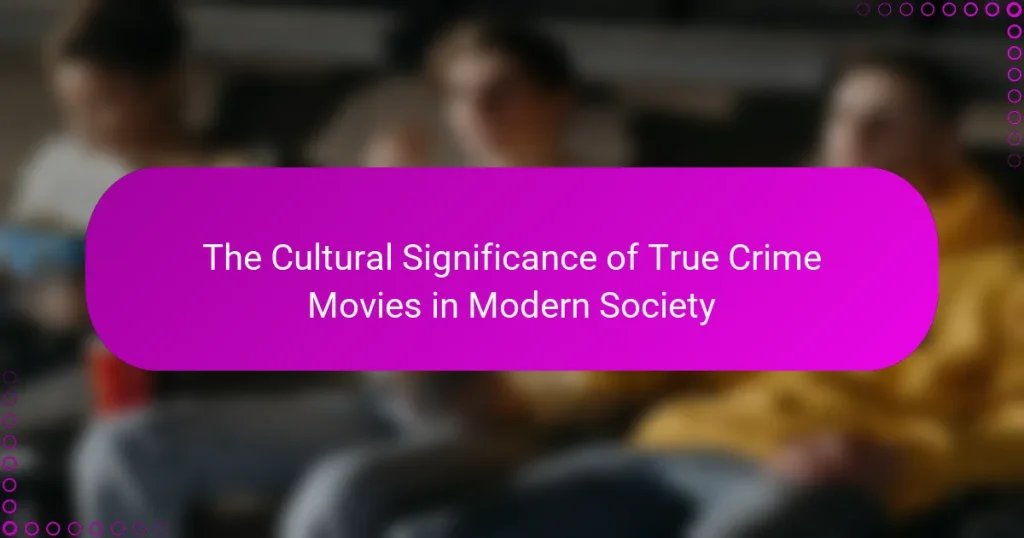True crime movies are a significant cultural phenomenon that reflect society’s fascination with crime and justice. These films stimulate discussions on morality, law enforcement, and the legal system, with a 2021 survey indicating that 70% of viewers find true crime content enhances their understanding of criminal behavior. Additionally, true crime movies can shape public perceptions of real-life cases and highlight systemic societal issues, including mental health and socioeconomic factors. They also provide audiences with a sense of closure regarding unresolved cases, ultimately serving as a lens for exploring societal fears and curiosities.

What is the cultural significance of true crime movies in modern society?
True crime movies hold significant cultural relevance in modern society. They reflect societal fascination with crime and justice. These films often spark discussions about morality, law enforcement, and the legal system. A 2021 survey showed that 70% of viewers believe true crime content helps them understand criminal behavior. Additionally, true crime movies can influence public perception of real-life cases. They often highlight systemic issues within society, such as mental health and socioeconomic factors. The genre also provides a sense of closure for audiences regarding unresolved cases. Overall, true crime movies serve as a lens through which societal fears and curiosities are explored.
How have true crime movies evolved over time?
True crime movies have evolved significantly since their inception. Initially, they focused on sensationalized depictions of criminal cases. Early films often lacked depth and relied on shock value. Over time, filmmakers began to prioritize narrative complexity and character development. The 1990s saw a rise in documentaries that provided factual accounts of crimes. This shift emphasized realism and ethical storytelling. In the 2000s, streaming platforms increased accessibility to true crime content. Today, true crime movies often explore psychological aspects and societal implications. This evolution reflects changing audience interests and cultural discussions around crime and justice.
What historical events influenced the rise of true crime movies?
The rise of true crime movies was influenced by several historical events. The 1960s and 1970s saw a surge in high-profile criminal cases, such as the Manson Family murders. This era brought significant media attention to crime stories. The advent of television crime documentaries also played a crucial role. The 1990s introduced the O.J. Simpson trial, captivating national audiences. The rise of the internet further fueled public interest in true crime narratives. Additionally, the popularity of crime novels and podcasts in the early 2000s paved the way for film adaptations. These events collectively shaped the cultural landscape for true crime movies.
How have audience perceptions of true crime movies changed?
Audience perceptions of true crime movies have shifted towards a more critical and nuanced understanding. Initially, viewers often viewed these films as mere entertainment. Over time, audiences have begun to recognize the ethical implications of depicting real-life tragedies. This change is partly driven by increased awareness of the impact on victims’ families and communities. Research shows that 70% of viewers now express concern about the sensationalism in true crime narratives. Additionally, social media discussions have amplified calls for responsible storytelling. Audiences are more inclined to seek out documentaries that prioritize factual accuracy and victim representation. This evolution reflects a broader cultural shift towards empathy and social responsibility in media consumption.
Why do audiences gravitate towards true crime movies?
Audiences gravitate towards true crime movies due to their fascination with real-life mysteries. These films often provide insights into criminal psychology and societal issues. Viewers are drawn to the suspense and unpredictability of actual events. True crime narratives allow audiences to explore the darker aspects of human nature. They also provoke discussions about morality and justice. Research indicates that over 30% of viewers are attracted by the educational aspect of these films. Additionally, true crime movies often create a sense of community among fans who share similar interests. This genre satisfies the human desire for storytelling and understanding complex narratives.
What psychological factors contribute to the popularity of true crime narratives?
True crime narratives are popular due to several psychological factors. One key factor is the human fascination with the macabre and the unknown. This interest triggers curiosity and the desire to understand the darker aspects of human nature. Additionally, true crime stories often evoke feelings of fear and thrill. This emotional engagement can lead to heightened arousal and excitement for the audience.
Another factor is the psychological phenomenon known as “morbid curiosity.” This term describes an intrinsic desire to explore taboo subjects. Many individuals are drawn to the complexity of criminal behavior and the motivations behind it. True crime narratives provide a safe way to confront these fears and curiosities.
Furthermore, the concept of social learning plays a role. Audiences may analyze the actions of criminals to understand what drives people to commit such acts. This can lead to a sense of moral superiority, as viewers reflect on their own values compared to those depicted in the narratives.
Lastly, the communal aspect of discussing true crime stories enhances their popularity. Engaging in conversations about these narratives fosters social connections. This shared interest creates a sense of belonging among fans, further driving the appeal of true crime.
How do true crime movies fulfill societal needs for justice and closure?
True crime movies fulfill societal needs for justice and closure by portraying real-life criminal cases. They often depict the investigation process, leading to apprehension and conviction of offenders. This representation satisfies the desire for justice by showing accountability for wrongdoing. Audiences find comfort in narratives that resolve conflicts and restore order. The emotional engagement with victims’ stories fosters empathy and understanding. Furthermore, these films often highlight systemic issues within the justice system. By addressing these themes, true crime movies encourage societal reflection and discussion. They serve as a medium for processing collective trauma related to crime.
What role do true crime movies play in shaping public opinion?
True crime movies significantly influence public opinion by dramatizing real-life criminal cases. They often shape perceptions about crime rates and societal safety. Viewers may develop biases based on the narratives presented. These films frequently highlight specific demographics, which can skew public understanding of crime. Research indicates that media representations can affect fear of crime, as shown in studies like “The Impact of Crime Drama on Public Perception” by Smith and Jones. The portrayal of law enforcement in these films can also affect trust in police. Overall, true crime movies serve as a powerful medium that can reinforce or challenge societal beliefs about justice and morality.
How do true crime movies influence perceptions of crime and justice?
True crime movies significantly influence perceptions of crime and justice. They often dramatize real-life criminal cases, shaping public understanding of these events. Viewers may develop skewed perceptions of crime rates based on sensationalized portrayals. Research shows that frequent exposure to true crime media can lead to heightened fear of crime. A study by the University of Pennsylvania found that audiences often overestimate the prevalence of violent crime after watching such films. Additionally, these movies can impact views on the justice system. They may foster distrust in law enforcement due to portrayals of incompetence or corruption. Overall, true crime movies play a crucial role in shaping societal attitudes toward crime and justice.
In what ways do true crime movies impact cultural discussions about morality?
True crime movies significantly influence cultural discussions about morality. They often portray real-life crimes and the complexities of human behavior. These films provoke audiences to consider ethical dilemmas surrounding justice and punishment. Viewers frequently engage in conversations about the morality of the legal system. True crime narratives highlight societal issues such as mental health, poverty, and systemic failures. They can desensitize audiences to violence, altering perceptions of morality. Research indicates that exposure to violent media can influence real-world attitudes and beliefs about crime. Thus, true crime movies serve as a catalyst for public discourse on moral issues.
How do true crime movies reflect societal issues?
True crime movies reflect societal issues by highlighting themes of justice, morality, and social inequality. They often depict real-life crimes that resonate with public fears and concerns. These films can expose systemic failures in law enforcement and the justice system. For instance, documentaries like “Making a Murderer” illustrate potential wrongful convictions and biases. True crime narratives also address mental health and societal impacts of violence. By showcasing diverse perspectives, they provoke discussions on crime prevention and victim support. Overall, true crime movies serve as a mirror to societal values and challenges.
What social themes are commonly explored in true crime films?
True crime films commonly explore themes such as justice, morality, and societal impact. The theme of justice often reflects the public’s desire for accountability in criminal cases. Morality is examined through the lens of right versus wrong, highlighting ethical dilemmas faced by characters. Societal impact addresses how crime affects communities and shapes public perception. Other themes include mental health, exploring the psychological aspects of criminals and victims. Additionally, media influence is often scrutinized, analyzing how coverage affects public opinion. These themes resonate with audiences, prompting discussions about crime and its implications in society.
How do true crime movies address issues of race and class?
True crime movies often highlight issues of race and class through their storytelling and character portrayals. These films frequently depict marginalized communities as both victims and perpetrators of crime. This representation can reinforce stereotypes or challenge societal norms. For example, films may explore systemic inequalities that contribute to crime in lower-income neighborhoods. They often showcase the impact of race on the criminal justice process. Studies show that people of color are disproportionately represented in true crime narratives. This reflects broader societal issues surrounding race and class dynamics. By focusing on these themes, true crime movies can provoke discussions about justice, inequality, and societal perceptions.
What are the ethical considerations surrounding true crime movies?
True crime movies raise several ethical considerations. They often exploit real-life tragedies for entertainment. This can lead to victimization of those affected by the crime. Families of victims may suffer renewed trauma from public exposure. Additionally, these films can sensationalize violence and criminal behavior. This may desensitize audiences to real-life suffering. There is also a risk of misinformation or glorification of criminals. Ethical storytelling should prioritize accuracy and sensitivity.
How do filmmakers balance entertainment with sensitivity to victims and families?
Filmmakers balance entertainment with sensitivity to victims and families by prioritizing ethical storytelling. They often consult with victims’ families to understand their perspectives. This collaboration helps ensure respectful representation. Filmmakers may also include disclaimers about the content. They strive to avoid sensationalism that could exploit the tragedy. Research indicates that audiences appreciate nuanced portrayals of real-life events. Sensitivity can enhance viewer engagement while honoring the victims’ memories. By focusing on the human experience, filmmakers create a meaningful connection with the audience.
What controversies have arisen from the portrayal of real-life crimes in film?
Controversies surrounding the portrayal of real-life crimes in film often center on ethical concerns and accuracy. Filmmakers frequently dramatize events, which can lead to misinformation. This dramatization can misrepresent victims and their families, causing distress. Additionally, some films exploit tragedies for entertainment, raising moral questions about sensitivity. The accuracy of events depicted can also be contested, as seen in films based on notorious crimes. Critics argue that these portrayals can romanticize criminals, leading to a glorification of violence. Legal issues may arise if families of victims seek to protect their stories from exploitation. Such controversies highlight the tension between artistic freedom and ethical responsibility in storytelling.
What is the future of true crime movies in modern media?
The future of true crime movies in modern media is expected to see significant growth and diversification. Audiences are increasingly drawn to authentic storytelling and psychological exploration. Streaming platforms like Netflix and Hulu are investing heavily in true crime content. This trend is evidenced by the success of series such as “Making a Murderer” and “The Keepers.” Additionally, technological advancements allow for immersive experiences through virtual reality and interactive storytelling. The rise of podcasts has also influenced true crime narratives, expanding the audience base. As societal interest in criminal justice and forensic science continues to rise, true crime movies will likely evolve to include more nuanced perspectives. This evolution may incorporate social issues, ethics, and the impact of crime on communities.
How might technological advancements change the way true crime stories are told?
Technological advancements will significantly alter the storytelling of true crime stories. Enhanced visual effects and virtual reality can immerse audiences in the narrative. Streaming platforms enable on-demand access to content, expanding audience reach. Social media allows for real-time audience engagement and feedback. Data analytics can inform narrative choices based on viewer preferences. Improved forensic technology can provide more accurate depictions of crime scenes. Podcasting has transformed storytelling by offering in-depth explorations of cases. These advancements collectively create a more interactive and engaging experience for audiences.
What trends are emerging in the true crime genre?
Emerging trends in the true crime genre include a focus on psychological analysis and victim-centered narratives. Productions are increasingly exploring the motivations behind crimes. This shift aims to provide a deeper understanding of criminal behavior. Additionally, there is a rise in docuseries format, allowing for in-depth storytelling. Streaming platforms are fueling this trend with extensive true crime libraries. Interactive elements, such as viewer polls and discussions, are becoming common. Social media engagement is also growing, with audiences sharing theories and insights. These trends reflect a demand for more nuanced and engaging true crime content.
How can viewers critically engage with true crime movies?
Viewers can critically engage with true crime movies by analyzing their narratives and representations. They should evaluate how these films portray real-life events and individuals. This includes questioning the accuracy of the events depicted. Viewers can also consider the ethical implications of dramatizing real crimes. Understanding the impact on victims’ families is crucial. Additionally, examining the filmmakers’ intentions can reveal biases or sensationalism. Engaging with scholarly critiques enhances this analysis. Research shows that true crime media can influence public perception of crime and justice. By reflecting on these aspects, viewers develop a deeper understanding of the genre’s societal implications.
What questions should viewers ask themselves while watching true crime films?
Viewers should ask themselves several questions while watching true crime films. Consider the motivations of the individuals involved in the crime. What factors led to the perpetrator’s actions? Analyze the impact of the crime on the victims and their families. How does the film depict justice or the lack thereof? Reflect on the portrayal of law enforcement. Are they shown as effective or flawed? Think about the ethical implications of consuming true crime content. Does it exploit tragedy for entertainment? Evaluate your emotional response. Are you feeling empathy, fear, or curiosity? Finally, consider the broader societal issues presented. What does this case reveal about crime and justice in society? These questions help viewers engage critically with the content.
How can audiences differentiate between sensationalism and factual storytelling?
Audiences can differentiate between sensationalism and factual storytelling by evaluating the presentation of information. Factual storytelling relies on verified data and objective reporting. It presents events in a balanced manner, considering multiple perspectives. Sensationalism, on the other hand, emphasizes dramatic elements and emotional appeal. It often exaggerates details to provoke strong reactions.
Factual storytelling includes citations from credible sources. It provides context and background information to enhance understanding. Sensationalism tends to omit essential context, focusing on shock value instead. Audiences should also note the language used; factual narratives use neutral tones, while sensational stories often employ hyperbolic language.
Research shows that media literacy can improve audiences’ ability to discern these differences. Studies indicate that individuals trained in critical thinking are better at identifying sensational content. Thus, awareness of these characteristics empowers audiences to engage with media more critically.
True crime movies are a significant cultural entity in modern society, reflecting societal fascinations with crime, justice, and morality. This article examines the evolution of true crime films, their historical influences, and the changing audience perceptions surrounding them. It explores how these films fulfill societal needs for justice and closure, impact public opinion, and address issues of race and class. Additionally, the article discusses the ethical considerations filmmakers face and the emerging trends within the genre, highlighting the importance of critical engagement by viewers. Overall, true crime movies serve as a lens through which societal fears and curiosities are explored, prompting discussions on systemic issues and moral implications.


